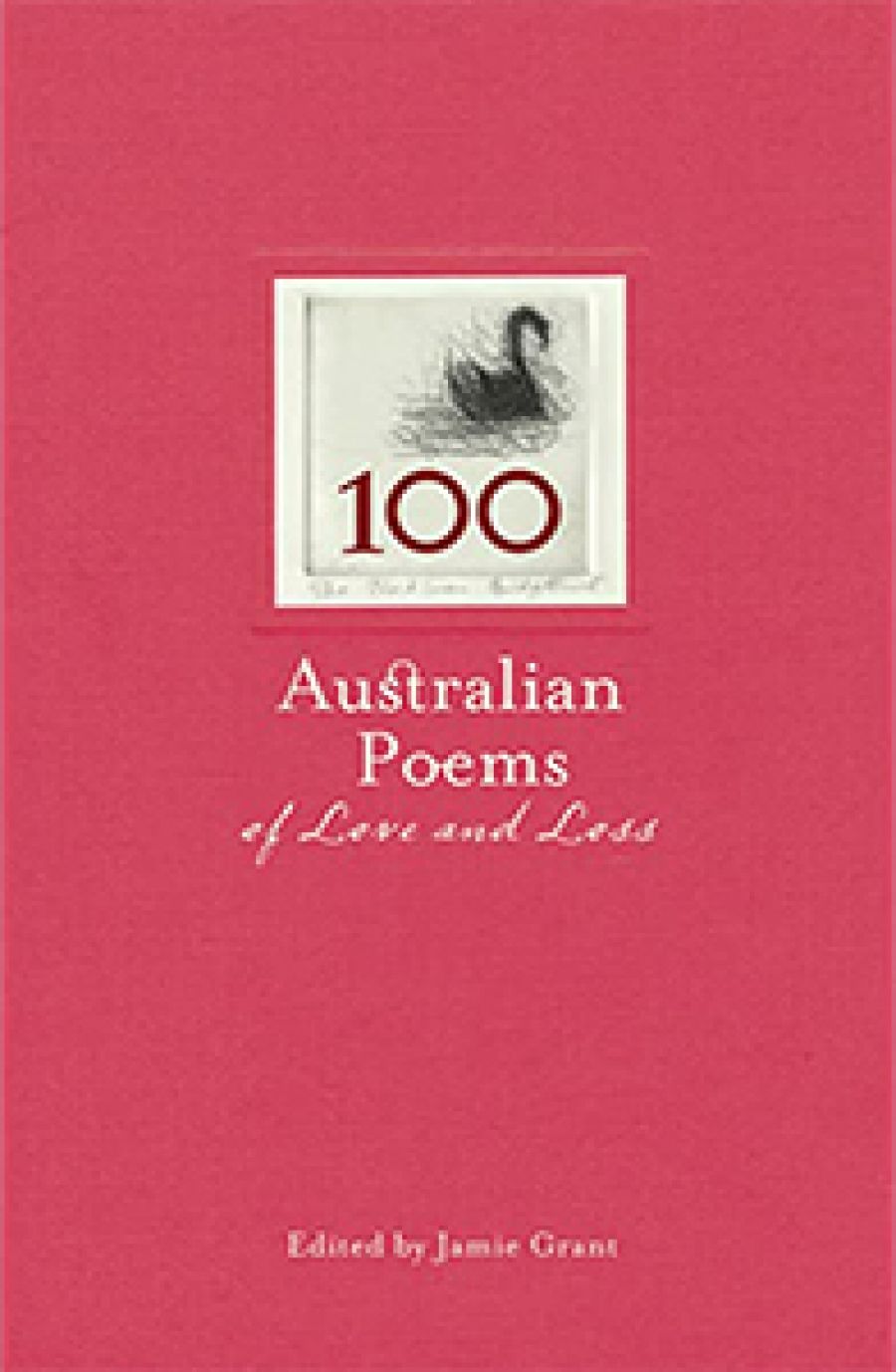
- Free Article: No
- Contents Category: Anthology
- Custom Article Title: David McCooey reviews '100 Australian Poems of Love and Loss' edited by Jamie Grant
- Review Article: Yes
- Online Only: No
- Custom Highlight Text:
100 Australian Poems of Love and Loss is the companion volume to Jamie Grant’s 100 Australian Poems You Need to Know (2008). The title of the new anthology shies away from its predecessor’s imperative mode, but remains a marketer’s dream. What is poetry about if not love and death? What is poetry’s purpose if ...
- Book 1 Title: 100 Australian Poems of Love and Loss
- Book 1 Biblio: Hardie Grant, $39.95 hb, 215 pp
Like its companion piece, 100 Australian Poems of Love and Loss is handsomely published, with monochrome illustrations. It is presumably aimed at those who are attracted to poetry as a form of occasional expression and to books as aesthetic objects. Interestingly, though, the actual poems may not be what such a market expects. Reading this feltlike buying a CD called 100 Classical Favourites, only to find Ligeti alongside Pachelbel’s Canon.
Having said that, thanks to the inclusion of poems from the nineteenth century and the early twentieth century, there is plenty here that does adhere to conventional ideas of poetry: work that is formally conservative, tonally sentimental or comic, and intellectually conventional. But two features of the anthology make it far from thepoetic equivalent of 100 Classical Favourites: the emphasis on modern poetry, and the collection’s slightly scholarly presentation (its introductions and biographical notes). The ‘scholarly’ mode is further evident in Grant’s willingness to recognise some of the older work as primarily of historical interest.
Grant, a poet himself, observes that love and loss are covered in formal poetic terms by the epithalamium (a wedding poem) and the elegy (a formal lament). While the former is rare in Australian literature, the latter is ubiquitous. Indeed, Kenneth Slessor’s ‘Five Bells’, widely considered Australia’s greatest poem, is an elegy. The two forms also allow Grant to present Les Murray, the author of at least one outstanding poem in each form, as central here. Murray’s ‘Towards the Imminent Days’ is one of the few obviously ambitious epithalamia in Australian literature. ‘The Last Hellos’, his elegy for his father, is also here, but the emphasis in the last line – ‘Fuck thém. I wish you God’ – is erroneously placed on ‘Fuck’. Perhaps Murray should have stuck to italics.
An epithalamium is not a love poem, and plenty of poems that aren’t elegies deal with death, and so, to its great advantage, this collection looks widely for its poems of ‘love and loss’. It includes works that are satirical, comic, and ‘elegiac’, the term used to designate poetry that is generally concerned with loss, mutability, and mortality. The elegiac is an especially powerful category of poetry, as we see in Chris Wallace-Crabbe’s ‘For Crying Out Loud’, his superb mini-essay on time, ‘that sarcastic medium’.
As the choice of this poem might suggest, Grant doesn’t always choose the obvious selection for a particular poet. Wallace-Crabbe has written a number of powerful elegies for his adult son that one might have expected to be represented here. Similarly, Philip Hodgins’s extraordinary self-elegies are passed over for the more elegiac ‘Leaving’. One of Grant’s strengths is to find poems with an ‘edge’ to them, such as Barbara Giles’s ‘Eve Rejects Apples’, a comic account of the poet repelling ‘seduction / entirely in French’ while visiting the Louvre, or the satirical Hudibrastic poetry of Peter Porter’s ‘Applause for Death’.
In addition to the satirical and the comic, there are moments of surrealist energy, such as John Forbes’s parodic love poem ‘Rrose Selavy’, in which the love object, Julie, is ‘a crazed spanner in the intricate works of death!’ Talking of death, Forbes appears again in the ‘loss’ section of the anthology. Grant includes Forbes’s elegy for his fellow poet Martin Johnston. This acts as a companion piece to the highlight of the anthology, Kate Jennings’s own superb straight-talking elegy for Johnston, ‘Without Preamble’. Jennings’s poem is largely an attack on alcohol abuse. Few elegists have the nerve to write, ‘let those who will gussy up the facts. I need / only remember you are dead, and I nearly was so’.
Shamefully, I was unaware of Jennings’s tombeau (the name some critics give to elegies written for other poets), but it reminds me that the best thing about anthologies is the surprises they offer. For this reason alone, it is pointless (and narcissistic) for critics to harp on about what individual poems are missing from an anthology, unless that anthology is making special claims for itself.
One could easily come up with another 100 poems for this anthology, but Grant’s collection is undoubtedly an interesting one. I laboured through the colonial poems, though even here I had an unexpected belly laugh from A.B. Paterson. A few poems irritated me, especially Stephen McInerney’s ‘For Women’, which seems to think that an ironic tone and light verse give a licence to write twaddle, such as the sentiment that without women there would be ‘No ill words ever spoken / Among men’.
It is a shame that McInerney is the sole representative of those aged under forty; the anthology under-represents the young. (Keats, who died in his twenties, had quite a few things to say about love and loss.) Second youngest, and last in the book, is Jamal Sharah, the young poet du jour for anthologists in the 1990s. Sharah’s only book, Path of Ghosts, appeared in 1994, but ‘Package for Another World’, about the first dog in space, is a searing and unexpected finale to Grant’s anthology, offering a strange and moving conjunction of love and loss.


Comments powered by CComment